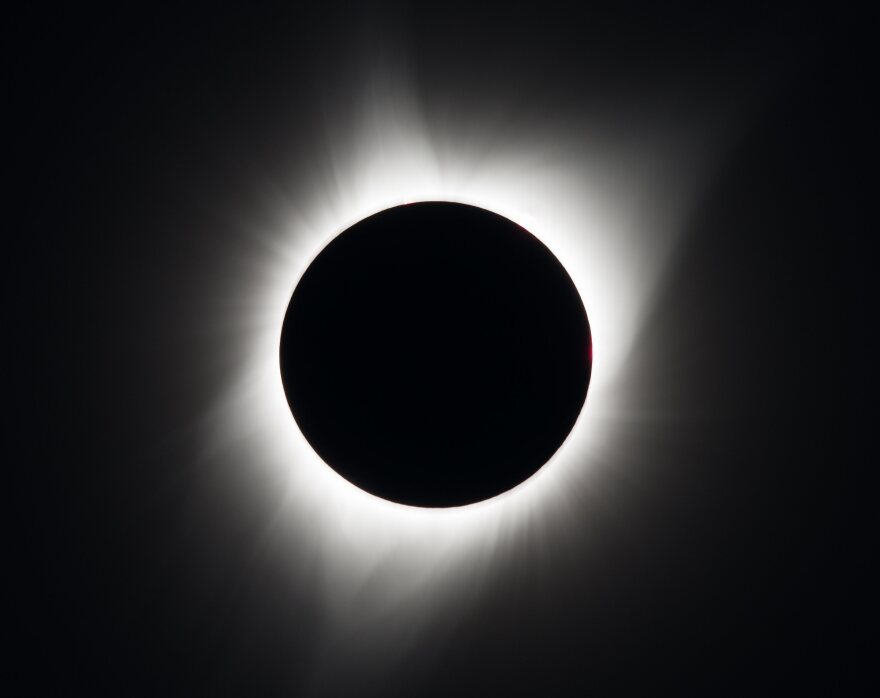Next April, a total solar eclipse will track across the U.S. from Texas to Maine. Northern New York and New England are in the path of the totality that will last more than 4 minutes. With an expected bump in visitors to the region hoping to catch a glimpse, educators and administrators at SUNY Plattsburgh have already begun preparing for the astronomical event.
The April 8th, 2024 solar eclipse could be a once-in-a-lifetime experience for many, and English professor and SUNY Plattsburgh Dean of Arts and Sciences Dr. Genie Babb is asking the public to do more than save the date.
“One of our taglines is save the year. So we want to create a number of events, invite speakers on campus to sort of lead up to the eclipse itself,” said Babb.
SUNY Plattsburgh will be in the right place at the right time next year. The university has formed a committee to start planning for the big day.
Lisabeth Kissner, a physics lecturer and director of the Northcountry Planetarium, said a solar eclipse happens when the moon moves in front of the sun, creating a shadow on earth’s surface.
“And then as we rotate, the moon's shadow will appear to track across the surface of the earth. Any person within that track will see the sun's light become eclipsed or come to what we call totality, blocked out,” said Kissner.
The last time a total eclipse was viewable in the United States was 2017. Kissner traveled to Idaho to see it, which she said generated a lot of enthusiasm for the next one.
“The geometry of this eclipse is going to allow for a longer span of totality. And the estimate is that probably there will be more viewing of this, because of the previous 2017 got so much hype,” said Kissner.
Dr. Babb says the school has started arranging guest lectures and events, including NASA astronauts.
“We've targeted several people we recommend and several people that have that majored in disciplines that we have on this campus. And so, we're hoping to get one or two of those astronauts to come and visit,” said Babb.
Instructors are also being asked to develop curricula around the eclipse.
Plattsburgh English professor and Director of the Center for Interdisciplinary and Area Studies Michael Devine said the eclipse celebration will focus on a theme of alignment.
“We're going to align efforts, we're going to get the city of Plattsburgh, town of Plattsburgh Chamber of Commerce, the library, arts organizations to try to align efforts where we are doing something that is using the scientific phenomenon as a basis really to meditate on even deeper issues, our place in the universe, our relationship to each other,” said Devine.
As studies are being developed, Devine said the 2024 eclipse brings a sense of deep meaning.
“Like, what does it mean to pass from darkness into light? What does it mean to all share a common vision? So, I think it's a really unique opportunity for students, professors, classes, community members to all kind of participate in that and say, like, ‘Hey, this is like a great unifying opportunity. And it doesn't come around very often. So, let's not waste it,’” said Devine.
Devine also envisions the programming will have an impact on the college learning experience.
“One of the things that I think that we now know about college is that we don't want to just be spoken to by experts, you know? Explain away the eclipse, like you know it and I don't. Right? So, I think a lot of what the future of the humanities and future of college entails is this kind of participatory, democratic voice and hopefully the programming over the next year can really have that unifying feel,” said Devine.
NASA recommends safe solar viewers, and warns against looking directly at the sun.
Solar eclipses occur about every 18 months, but they’re not always visible to everyone on a planet that’s mostly covered in ocean. If you miss the 2024 eclipse in the U.S., you may not get another chance until 2044.



